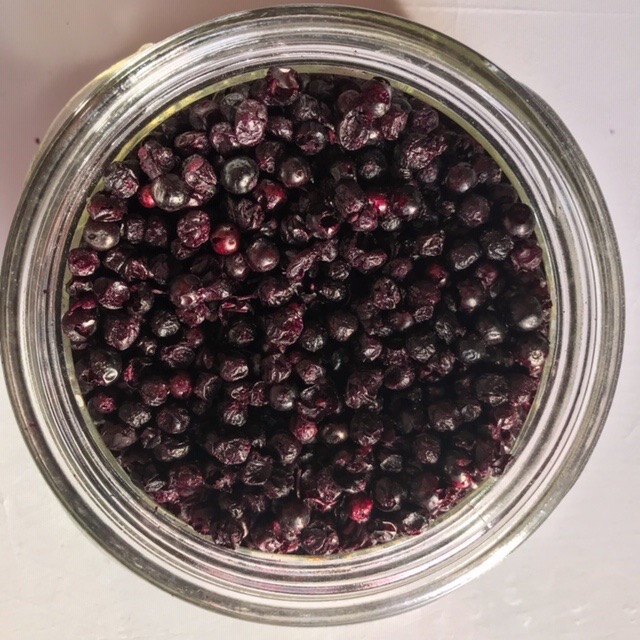Bulk Freeze Dried Elderberries - Bulk packed $60/8 oz. & $110/lb.
(sustainably grown, plus USPS shipping to USA addresses.) Monthly supply contracts available with possible savings. Please email info@midwest-elderberry.coop if you want 10 lb. or more to save on freight. Volume savings are possible over 10 lb. or with scheduled monthly deliveries. We can process up to 100lb./month.
Please use the PayPal buttons below unless you want more than 5 lb. If the buttons are missing, then we have no product to sell.
Freeze dried American elderberries are great whole for salad toppings, smoothies and added to cereals - especially a muesli or granola, or you can easily smash them to a powder. [Also, see the YouTube video below.]

Freeze drying generally preserves 97% of berry nutrients. It simply removes the 80% of water with the least amount of nutrient degradation. Thus, a 1 oz./1 cup pouch of freeze dried berries is about the same as 5 oz., or a little over 2 cups of fresh or frozen berries.
The prices shown below include shipping via USPS Priority Mail in boxes to reduce the chance of crushing.
[To place an order, please click on the link when present. No link means there’s no product immediately available.]
We only sell berries from our grower network, and we only dry our native elderberries when we have excess inventory or when the order is reserved in advance by contract. The freeze dried berries we have available were grown sustainably
These native Sambucus canadensis were freeze dried on the farm where they were grown. The dryer is stainless steel, and it dries from 2-2.5 cups of frozen berries for about 28 hours to make the 1 cup = 1 oz. of freeze dried berries.
As is typical of our mostly hand processed elderberries, you will find a few bits of dried stem and berries that are not fully ripe but safe to eat. This is due to the natural ripening strategy of native elderberry. Even when the cyme of berries looks ripe, there are a few not quite there. We do our best to skim those off when processing, but a few usually escape us. Even the powder left in the pouch has anthocyanins in it. If you wash it out with a little water, the water turns blue, and I drink it.
Three Recipes made with 1oz./1 cup of Freeze Dried Elderberries: Cordial, Chutney & Shrub
Every HOMESTEADER should GROW this berry! Elderberry - YouTube
The Elderberry Cordial is made with 1 cup of freeze dried berries, 2 cups of tea (water + cinnamon & cloves) and 1 cup of honey. Berries are strained and re-used to make a chutney. The shrub is made with 1 cup of freeze dried berries, 1 cup of good apple cider vinegar, and 1 cup of honey. Any hydrated or used freeze dried elderberries may be eaten. I add them to my hot cereal or make a sauce with them.
Comments about elderberry syrups made with our freeze dried berries: “easy to make”, “smooth taste”, “delightful flavor”.
Are Raw Native Elderberries Safe?
A multi-year project ending in 2018 by University of Missouri researchers discovered that ripe native (Sambucus canadensis) black elderberries and their seeds do not have any meaningful level of glycosides (pre-cyanides) that can make one sick. [Note: Ripe native (S. canadensis) berries often appear more reddish in color than the European (nigra) berries, which is probably due to the additional anthocyanins found in the North American condenses cultivars. Native berries are also quite a bit smaller.]
This does not seem to be true for European Sambucus nigra elderberries, which have a history of production processes to neutralize the potential issues related to glycosides. That is why those imported ingredients are more processed and may also be part of the reason why native elderberries taste better than the European ones.
While the latest research at the university of Missouri (soon to be published) indicates that fresh/frozen, ripe elderberries do not have significant levels of glycosides, some few people seem to be strongly affected by consuming raw elderberries or elderberry juice, where it upsets their digestive system. Why they have a lower tolerance for elderberry is not clearly understood. Fresh and raw frozen berries that are fermented or heated so that the entire volume reaches 180° F, or more have not been associated with any health related incidents to our knowledge.
Technical Note: Cultivar “Marge” was not a part of the above study and is likely to have more glycosides present since it is classified as an American adapted European Sambucus nigra. (4/9/2019 email from Andrew Thomas lead researcher UMO)